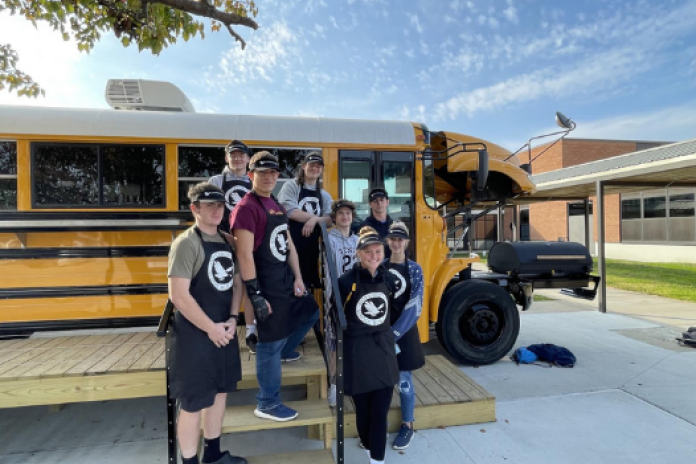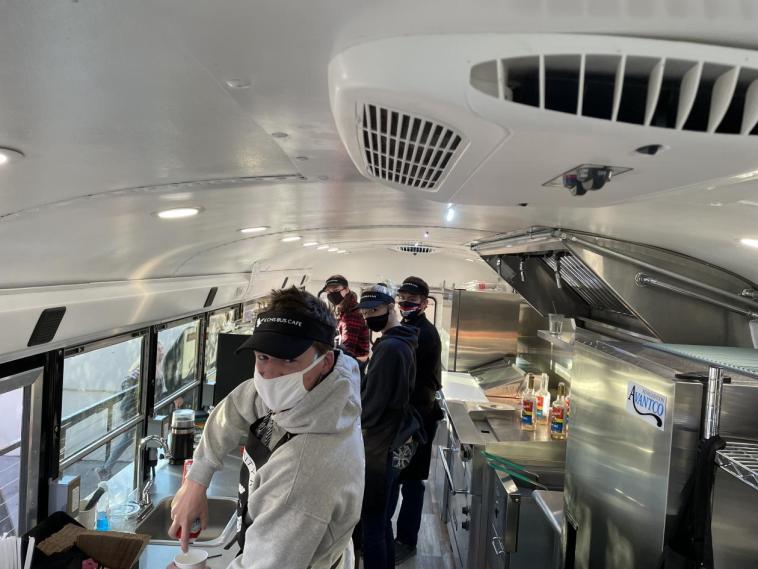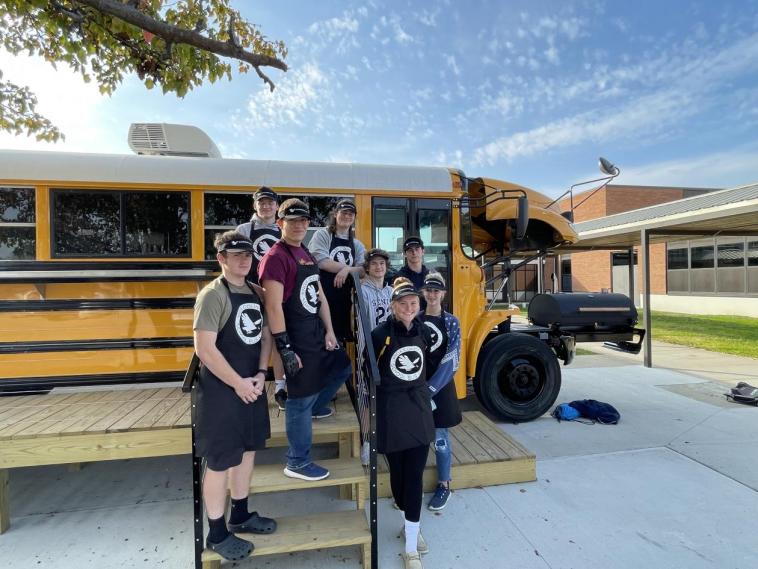Wiring Up with Electric School Buses in Knox County, Missouri

In collaboration with partners and communities, WRI’s Electric School Bus Initiative aims to build unstoppable momentum toward an equitable transition of the U.S. school bus fleet to electric, bringing health, climate and economic benefits to children and families across the country and normalizing electric mobility for an entire generation. The Electric School Bus Series shows how superintendents and fleet managers across the United States have pursued school bus electrification in their own communities. This edition covers Knox County, Missouri, which worked closely with its rural electric cooperative on electric mobility and found a creative way to fulfil vehicle scrappage requirements through converting its diesel bus into a coffee shop.
This piece is based off an interview with Andy Turgeon, Superintendent for Knox County R-I School District.
Ten years ago, amid a trend of declining enrollment, Knox County R-I School District — the second largest geographically in Missouri, serving around 400 K-12 students — embarked on a journey to distinguish their schools as part of an effort to attract and retain students and families.
According to an interview with Superintendent Andy Turgeon, Knox County’s school board has a long history of forward-thinking on technology and sustainability. After success with on-site solar, Knox County began looking for other ways to reduce expenditures, increase revenues and expose students to a growing field that could offer well-paying, clean energy jobs within their own community. At the suggestion of Lewis County REC, the district’s electric cooperative, Turgeon and his team turned their sights to an electric school bus.
In 2020, the district began searching for funding, ultimately securing four grants: one state grant from Missouri’s Department of Natural Resources Volkswagen funding ($169,126); one federal grant from the U.S. Department of Agriculture’s Community Facilities program ($116,626); and two from utility partners, Associated Electric Cooperative Inc. ($30,000) and Lewis County REC ($15,000). The utilities contributed as part of a pilot to explore bus performance and measure total cost of ownership. These incentives reduced the final cost of purchasing a Lion Electric Type C bus (not including charging and related infrastructure) to Knox County School District from $338,253 to just $7,500.
Motivation & Co-Benefits
The school district had experienced maintenance challenges with propane buses in the past and would therefore only consider diesel or electric buses. It ultimately chose electric for the health benefits, reduced operating expenses, zero-tailpipe emissions and resilience value. A unique element of electric school buses is their potential to serve as a backup battery, which could support both the school — having had learning disrupted in the past due to power outages — and the nursing home across the street during emergencies. Additionally, Knox County saw an opportunity to introduce students to a technology that was gaining traction and offered a future career path.
The district received its electric school bus six months after placing an order. Since acquiring the bus, Turgeon and the drivers have noticed how quiet and smooth the rides are — and how the students no longer have to yell to be heard over a diesel engine. Inspired by these changes, students hope to study the health impacts of continuous vibrations on the human body.
A requirement of many incentive programs is that the retired diesel bus must be scrapped. Instead of turning the bus over to a junkyard, Knox County School District repurposed the structure as a coffee shop.

The coffee shop offers hands-on design experience for industrial tech students, on-the-job training and business management for business students, marketing experience for media students, and greenhouse management and coffee plant cultivation for agriculture students. The coffee shop officially opened in September 2021 with students documenting the process throughout.
Since acquiring the bus, Turgeon and the drivers have noticed how quiet and smooth the rides are — and how the students no longer have to yell to be heard over a diesel engine.
Partners:
Turgeon recognizes the forward-thinking nature of the school board and the longstanding relationship with their local utility as instrumental:
- Knox County School Board actively prioritizes environmental protection and student safety. These values have influenced their willingness to try new on-site solar. Students helped install eight panels in 2019 totaling nearly 3 kW of solar. When Lewis County REC suggested integrating electric vehicles, the Board was excited by the proposal and the possibility of becoming the first school district in the state to have an electric school bus and embraced the idea.
- Lewis County REC, which is part of the greater Associated Electric Cooperated Incorporated, provides a number of resources to the county beyond power. Turgeon encourages other school districts to form a solid partnership with their utility as Lewis County REC’s regular presentations to his students have been mutually beneficial. They not only increase student education, but also support talent recruitment and energy consumption effects for the utility. For the electric school bus, Lewis County REC provided a letter of support to Missouri’s Department of Natural Resources for Knox’s grant application.
Pilot Status:
Today, the students and drivers have enjoyed their electric school bus experience, with drivers engaging in friendly, self-organized competition for who can achieve the greatest mileage out of a battery charge. To get to this place of confidence, Turgeon recognized early on that Knox County School District’s bus mechanic was the first person he needed on board. Turgeon approached his mechanic equipped with his own research to discuss the reduced maintenance of electric school buses.
The Lion bus has been operating since late February 2021 at an average cost of $0.124 per mile compared to their diesel buses’ average cost of $0.31 per mile. According to Knox’s public data tracker, the electric bus alone has avoided almost 24,380 pounds of greenhouse gas emissions — equivalent to planting 286 trees growing for 10 years — and saved over $1,300 as of early November 2021, or nearly $1,600 when including the savings from solar panels.
Looking ahead, Knox County School District is currently discussing the bus’s vehicle-to-grid (V2G) capabilities. There is the potential to save money through net metering: the bus would charge overnight at a lower energy cost and sell energy back to the grid when energy costs are higher. The savings would be applied as a credit to the monthly electricity bill.
Knox County schools believe that full electrification of their 14-bus fleet is in their future. While the terrain, snow and ice issues are no longer concerns due to successful operation to date, cost remains a barrier. The district has already applied for grants for two more buses through the Department of Natural Resources.
Greatest Challenge in Setting Up the Pilot:
Before the bus arrived, Knox needed to address community concerns, which included bus flammability, its range and cost. To alleviate concerns, Turgeon shared a flame retardant report showing the body does not ignite; assured parents the bus would be used on fixed routes; and showed the district only paid $7,500 for the bus thanks to grants. Turgeon and the school board leveraged multiple approaches to share information: ride and drives, bus tours in partnership with Lewis County REC, printing information in the local newspaper and answering questions on their Facebook page.
Since beginning operation, the bus has experienced technical issues with the regenerative breaking and the DC-DC converter. When installing USB ports in the bus, one of the relay switches that operates the regenerative breaking was knocked loose. Turgeon and his team quickly identified and fixed the issue after plugging in a laptop for remote communication and diagnostics. For the DC-DC converter, the cameras Knox County School District installed on the bus were not shutting off and were draining the onboard 12-volt battery. Once identified, the manufacturer sent a new onboard battery and the bus mechanic installed it within an hour.
All in all, Turgeon has not been dissuaded. He believes that the issues resulted from modifications the school district made to the buses rather than bus quality.
Advice for Other School Districts:
Knox County School District is actively tracking the bus’s performance data, information that may be useful to school districts interested in seeing real world performance and savings. On their website, they share insights, which include how battery range can be impacted by bus driver technique (e.g., regenerative breaking) as well as by features like air conditioning, heating and air brakes.
As a final note, Turgeon’s advice to others is “if you can get people excited about school — whether adults who work here or students who come here — you’re going to have a successful school. That’s my one thing every year is I ask my leaders: what’s something new that will get people excited to walk through these doors.” Their electric school bus was a clear answer.

Additional Resources:
- Knox County R-I School District’s Bus Project Portal
- Knox County R-I School District’s Electric School Bus Performance Data Tracker
- U.S. Department of Agriculture’s Rural Development Community Facilities Grant
- Missouri’s Department of Natural Resources Volkswagen Trust School Bus Funding
- Evergy Knox County R-1 Case Study
Want to learn more from the Electric School Bus Series? Explore more stories here.